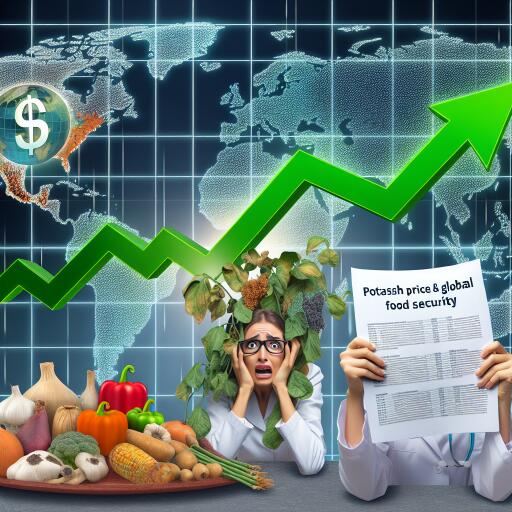
Global Potash Price Surge Threatens Global Food Security, Warns Study
A pivotal research collaboration involving some of the world’s leading institutions has recently brought to light a stark warning: the rapid increase in global potash prices poses a real and present danger to worldwide food security. This comprehensive study, involving teams from institutions such as University College London, the University of Edinburgh, and the UK Centre for Ecology & Hydrology, points to a concerning trend that could impact agricultural productivity across the globe.
At the heart of this issue is potassium, a nutrient critical for plant development, affecting everything from growth rates to photosynthesis. The study reveals that due to skyrocketing costs, there’s an increasing challenge in accessing potash, a key source of potassium, leading to widespread soil potassium deficiency. This deficiency hampers agricultural productivity, investigating that a significant portion of the earth’s farmland is now experiencing acute potassium shortages.
Regions like South-East Asia, Latin America, and Sub-Saharan Africa are particularly hit, with a vast expanse of their agricultural land suffering from severe nutrient depletion. The potential consequences of this development are dire, with millions of people’s food security at stake, especially given the growing global population and increasing food demand.
The root of the potash price hike is attributed to a “perfect storm” of factors, including a surge in demand, rising fuel costs, economic recoveries following pandemics, and geopolitical conflicts. Notably, geopolitical tension has a pronounced effect, given that a significant portion of the world’s potash supply is concentrated in a handful of countries. Specifically, Canada, Russia, Belarus, and China dominate this market, with Russia and Belarus alone responsible for over half of the global supply. The recent geopolitical upheavals and sanctions against Russia and Belarus have only intensified the uncertainty and volatility of potash prices, at one point witnessing a staggering 500% price increase in a single year.
The urgent recommendations from the study call for a comprehensive and coordinated global response. The establishment of regulations and policies to manage soil potassium effectively, akin to those for other essential nutrients like nitrogen and phosphorus, is deemed critical. Additionally, the need for enhanced monitoring of potassium stocks, improved forecasting to mitigate price fluctuations, and increased support for farmers to maintain soil health is highlighted.
Moreover, the researchers advocate for the investigation into the environmental impact of potash mining, the development of a circular potassium economy, and bolstered international cooperation to tackle the challenges of potash scarcity head-on. These measures are envisioned to provide a multifaceted approach to ensuring that agricultural lands remain fertile and productive, thereby protecting global food supplies against the backdrop of an uncertain future.
In conclusion, this comprehensive study serves as a wakeup call to the world, emphasizing the critical need for immediate and decisive action to address the burgeoning crisis in global potash supply. As the planet moves forward, the importance of securing our agricultural foundations against external shocks and stresses has never been more apparent, necessitating a collective effort to safeguard food security for generations to come.





Leave a Reply